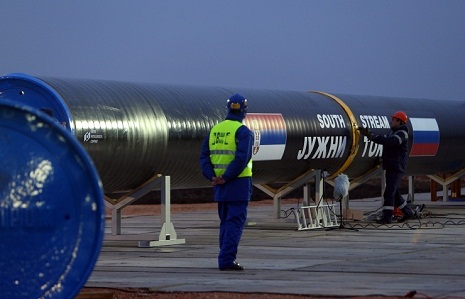Russian President Vladimir Putin on Monday paid a one-day state visit to Turkey to make a sensational statement the South Stream project for exporting an annual 63 billion cubic meters of natural gas to countries in southern and Central Europe along a route bypassing Ukraine would be discontinued. Putin explained that the measure had to be taken in view of the EU’s resistance: the project’s implementation ran into Bulgaria’s refusal to let construction work begin in its territory.
Gazprom now says it will turn the pipeline south, towards Turkey, which may serve as a major mediator in trading Russian gas. Putin declared that, firstly, the throughput of the existing pipeline to Turkey under the Black Sea — the Blue Stream — would be increased and secondly, Gazprom would create an extra gas hub in Turkey on the border with Greece.
The seabed stretch of the pipeline to Turkey will start at the world’s largest compressor plant Russkaya — originally identified as the starting point of South Stream in Russia’s Krasnodar Territory. The analyst said the know how of laying pipelines under the sea was well familiar and the new project could be carried out in a year or two. Besides, for Russia it will be far less costly to abandon the already mapped route and lay a pipeline across Turkey along abortive South Stream.
“South Stream’s termination will have adverse effects on extra gas supplies to Europe. In the meantime, according to experts well familiar with the state of affairs in the industry, the consumption gas — ecologically the cleanest fuel of all — in the European countries will be steady on the ascent for years to come,” Andrianov said.
“When the plans for South Stream were still on the agenda, Russia was seen as the main provider of gas to Europe. The gas carrier was to be laid outside Ukraine, which had proved an unreliable partner and rejected the fabulous conditions Moscow had offered to Kiev for jointly upgrading Ukraine’s pipeline system. Ukraine has invariably been a firm opponent of South Stream as a competitor capable of stripping its own pipelines of their original value. Now Kiev will redouble the attempts to have existing transit terms altered. The risks of transiting gas to the European Union may soar,” the analyst said.
“The South Stream project promised benefits to all Europeans. The obstructions that Brussels started putting up in its way, such as the peg to the third energy package, are phantasmagorical. By forcing Russia drop the project Brussels has punished itself,” Andrianov remarked.
The costs for Bulgaria alone will be as high as 400 billion dollars a year in missed incomes from gas transit,” he explained.
“The European Union is dancing to the United States’ tune. Washington has warned it would take sanctions against all those individuals and legal entities involved in laying South Stream. But the Europeans will find it really hard to discover an alternative to Russian gas, because the promised supplies of shale gas from the United States are a bluff. Russia’s decision to terminate South Stream is bound to have a sobering effect on hothead officials and politicians in the European Union,” Andrianov believes.
Already now we have seen a worried reaction from European gas consumers to Russia’s decision to abandon South Stream. The Times says that Putin has declared a gas war on Europe and Moscow is determined to punish the EU countries for its policies towards Ukraine. But Putin has not declared a war on the Europeans. They did that themselves and now should feel free to stop to think if they should proceed in Washington’s footsteps,” the analyst concluded.
More about:
















































